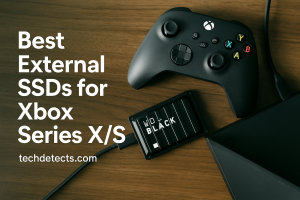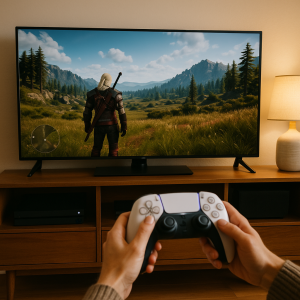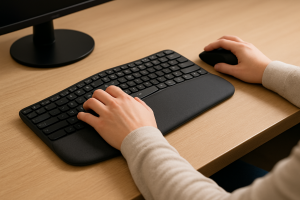Best Laptops for 3D Modeling (2026) — Creator Picks
3D modeling is the kind of work that makes a laptop show its true personality.

A machine can feel “fast” in everyday use and still struggle once you open a heavy Blender scene, a dense CAD assembly, or a Substance Painter project with high‑res textures.
This guide is built around what actually matters for 3D work in 2026: GPU VRAM, sustained performance (cooling), CPU headroom, RAM, and a display that’s comfortable for long sessions.
And yes—some “gaming laptops” are fantastic for 3D. The trick is picking the right class of laptop for your workflow.
Quick Picks (TL;DR)
- Best overall 3D laptop (power + thermals): Lenovo Legion Pro 7i
- Best premium portable powerhouse: Razer Blade 16
- Best creator-first 3D laptop (model + render + edit): ASUS ProArt P16
- Best max-power desktop replacement: MSI Raider / Titan class
- Best balanced portable 3D laptop: ASUS ROG Zephyrus G16
- Best workstation-grade option (ISV mindset): HP ZBook Studio
- Best Mac option for 3D creators: MacBook Pro 16
- Best value option for students / beginners: Acer Predator Helios Neo / ASUS TUF (right config)
What Matters Most for 3D Modeling (and What’s Overrated)
1) GPU is king for rendering (and often for smooth 3D workflows)
If you do GPU rendering (Blender Cycles GPU, Octane, Redshift, Unreal/Unity previews), your GPU choice is the biggest lever.
What to aim for:
- For serious 3D: RTX‑class NVIDIA GPUs are still the most common “safe bet” because of ecosystem support.
- For heavier scenes/textures: prioritize VRAM more than tiny benchmark differences.
2) VRAM is the real limiter in big scenes
You don’t “run out of FPS”—you run out of VRAM. VRAM gets eaten by:
- high‑poly meshes
- 4K/8K textures
- large assemblies
- complex shaders/materials
- real‑time engines (Unreal)
Simple VRAM targets:
- 8GB: entry level 3D / students (fine, but limiting)
- 12GB: comfortable baseline for many creators
- 16GB+: heavy scenes, serious texturing, future‑proofing
3) CPU matters for modeling, simulation, and viewport tasks
Even if you render on the GPU, the CPU still matters for:
- modeling operations
- physics/simulation tasks
- baking
- handling huge project files
- multitasking while working (browser references, Photoshop, etc.)
4) RAM: don’t trap yourself at 16GB if you’re serious
- 16GB is the minimum for 3D in 2026.
- 32GB is the real “comfortable” baseline.
- 64GB makes sense if you do heavy simulation, huge scenes, or lots of apps at once.
5) Cooling and sustained performance matter more than “peak specs”
A thin laptop with an RTX 4090 sticker can still underperform if it can’t hold power without throttling.
If you’re doing long renders, prioritize laptops known for strong thermals.
6) Display: sharpness and color accuracy = less fatigue
For 3D modeling, a good display helps you judge:
- shading and material response
- color and texture work
- fine geometry edges and detail
A great creator laptop usually has a better screen than a pure gaming laptop.
Best Laptops for 3D Modeling (2026)
Lenovo Legion Pro 7i
Why it’s here: This is the “workhorse 3D laptop” pick. Strong sustained performance, solid cooling, and configs that make 3D work feel stable and predictable.
Who it’s for: Anyone who wants serious 3D performance without living in a constant throttle/fan drama.
What it solves:
- Long render sessions without falling apart
- Great performance-per-dollar in high-power configs
- A reliable platform for Blender, Unreal, and heavy creative workloads
Trade-offs: Heavier and thicker than creator ultrabooks.
Razer Blade 16
Why it’s here: Premium build, strong GPU options, and a more travel-friendly vibe than bulky desktop replacements.
Who it’s for: Creators who travel and want premium portability without giving up real GPU rendering capability.
What it solves:
- A powerful mobile 3D workstation feel in a sleek chassis
- Great for on-location work, collabs, and commuting
Trade-offs: Expensive. Thin high-power laptops can get loud under sustained load.
ASUS ProArt P16
Why it’s here: A creator-first laptop that’s genuinely built for production workflows—often with a great OLED panel and “creator” tuning.
Who it’s for: 3D creators who also edit, color grade, design, and want a display that looks like a proper creative tool.
What it solves:
- A balanced model + render + edit workflow
- A beautiful display for texture and color work
- A professional-feeling creative laptop experience
Trade-offs: Configs vary by region. It’s not a cheap laptop.
MSI Raider / Titan class
Why it’s here: These are the “I want desktop power in a bag” machines. They usually deliver high wattage and strong cooling.
Who it’s for: Heavy renderers and creators who want maximum performance and don’t care about portability.
What it solves:
- Maximum sustained power for long renders
- Strong thermals and big cooling capacity
Trade-offs: Big, heavy, and not fun to carry daily.
Might want to check: MSI GE65 Raider Gaming Laptop -Review & Guides
ASUS ROG Zephyrus G16
Why it’s here: One of the best “balanced portable” choices—good performance, strong screen options, and easier to carry than thick gaming rigs.
Who it’s for: Students and creators who want to carry a capable 3D laptop daily.
What it solves:
- A realistic daily-carry 3D laptop
- Great for Blender, Substance, and Unreal work while staying portable
Trade-offs: Not as much sustained headroom as the thickest laptops.
HP ZBook Studio
Why it’s here: If you want a workstation mindset—stability focus, pro features, and a “business/creative” chassis—ZBook Studio is a strong choice.
Who it’s for: Professionals who prefer a workstation-class approach and value stability, build quality, and a less “gamer” look.
What it solves:
- Professional workflow comfort for long projects
- A clean, pro-friendly machine for studios and offices
Trade-offs: Pricing can be high for the specs, depending on configuration.
Lenovo ThinkPad P1
Why it’s here: ThinkPad P-series machines are a classic “workstation laptop” route—great keyboards, pro-friendly design, and strong build standards.
Who it’s for: Professionals who value keyboard comfort, durability, and workstation vibes.
What it solves:
- Long writing + creative sessions (excellent keyboard experience)
- Studio/office-friendly design
Trade-offs: Some configs prioritize thinness, which can limit sustained power vs thicker machines.
Dell XPS 16 (Creator config)
Why it’s here: If you want a premium, modern laptop that can still do real creative work (including some 3D), XPS 16 can be a great “one laptop for everything” option.
Who it’s for: Creators who want a premium everyday machine with enough GPU power for moderate 3D work.
What it solves:
- A stylish, premium laptop that’s still capable for 3D (depending on config)
- Great for mixed work: school + creative + office
Trade-offs: Not the top pick for heavy rendering compared to high-wattage gaming/workstation rigs.
MacBook Pro 16 (M‑series)
Why it’s here: For many creators, the MacBook Pro is the best “quiet, stable production laptop.” It’s excellent for creative pipelines, and some 3D workflows run very well—especially if you’re not dependent on CUDA‑only renderers.
Who it’s for: Creators who do mixed workloads (editing/design/3D) and value battery life, low noise, and stability.
What it solves:
- Quiet performance and great battery efficiency
- Excellent display and speakers for production work
Trade-offs: If your workflow depends on specific NVIDIA/CUDA renderers, a Windows RTX laptop is often the safer choice.
See our comparison: MacBook Pro M5 vs M4 – Apple’s AI Leap Compared.
Value Picks (Students / Beginners)
If you’re learning 3D or doing lighter projects, the best move is buying the right configuration.
Good value lines to watch:
What it solves:
- Affordable entry into GPU rendering and real-time 3D
- Great learning platform for Blender/Unreal
Trade-offs: Battery life and speakers are often “fine, not premium.”
Recommended Specs for 3D Modeling (2026)
Use this as your “safe target”:
- GPU: RTX‑class NVIDIA laptop GPU (aim midrange or higher for serious work)
- VRAM: 12GB preferred; 16GB+ for heavy scenes
- CPU: Modern high-performance Intel Core Ultra/HX or AMD Ryzen 7/9 class
- RAM: 32GB recommended (16GB minimum)
- Storage: 1TB SSD minimum (2TB if you cache and store large assets locally)
- Display: 16:10 preferred; high resolution is great, but don’t sacrifice brightness/comfort
Choosing the Right Laptop by Workflow
If you mostly model (and render lightly)
Prioritize: CPU + RAM + a comfortable screen. A midrange GPU is enough.
If you render a lot (GPU rendering)
Prioritize: GPU tier + VRAM + cooling. Pick a laptop known for sustained power.
If you do Unreal / real-time work
Prioritize: GPU power, VRAM, and cooling. Also prioritize a good keyboard and trackpad—you’ll live in shortcuts.
Comparison Table
| Laptop | Best for | Biggest strength | Biggest trade-off |
|---|---|---|---|
| Legion Pro 7i | Best overall | Sustained performance | Heavy |
| Razer Blade 16 | Premium portable | Power in sleek body | Expensive |
| ProArt P16 | Creator workflows | Display + creator tuning | Price/config variance |
| MSI Raider/Titan | Max performance | Desktop-like power | Very heavy |
| Zephyrus G16 | Balanced carry | Portable 3D capability | Less sustained headroom |
| ZBook Studio | Workstation vibe | Pro workflow comfort | Pricing variance |
| ThinkPad P1 | Pro + typing comfort | Keyboard/build | Thin configs can throttle |
| XPS 16 | Mixed work | Premium everyday creator | Not max render power |
| MacBook Pro 16 | Quiet stability | Battery + display | CUDA-only workflows |
Conclusion
For 3D modeling, your laptop should give you enough VRAM, enough RAM, and enough cooling to stay smooth for hours—not just for the first five minutes.
If you want the safest all‑round choice, the Lenovo Legion Pro 7i is the best blend of performance and sustained stability. If you want a creator-first machine with a beautiful screen, the ASUS ProArt P16 is a strong pick. And if you want maximum raw power for long renders, an MSI Raider/Titan style laptop is the most “desktop replacement” option.






